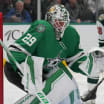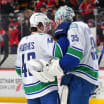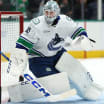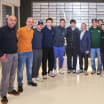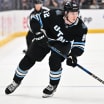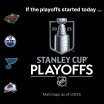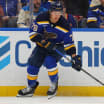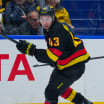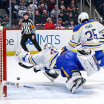The Coaches Room is a regular feature throughout the 2019-20 season by one of four former NHL coaches and assistants who will turn their critical gaze to the game and explain it through the lens of a teacher. Rob Zettler, Rob Cookson, Randy Carlyle and David Marcoux will take turns providing insight.
In this edition, Cookson, a former assistant with the Ottawa Senators and the Calgary Flames and video coach with the Philadelphia Flyers, talks about what a typical home game day is like for the coaches.
Game day routine crucial for coaches, player
Cookson goes over long, busy schedule assistants follow before puck drop
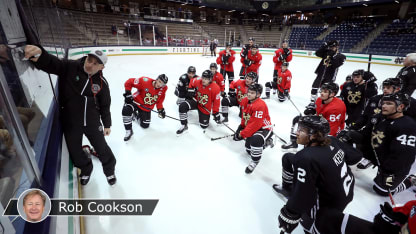
By
Rob Cookson / Special to NHL.com
When I was on Darryl Sutter's staff with the Calgary Flames, his biggest point on a day-to-day basis was, "You're only as good as your least prepared player." When we went to the Stanley Cup Final against the Tampa Bay Lightning in the 2003-04 season, he drove that message home every day.
That always stuck with me because I think it's so true. It's about preparation as a coaching staff and preparation as players.
Game day preparation is all about perfecting readiness in the players for the drop of the puck. For the coaching staff, that process usually starts one or two days ahead of time with breaking down an opponent's play with the use of video and analytical data.
Here's a rundown of a typical home game day for the coaches leading up to the opening face-off (note: times would be later for road games):
Getting started: 6:45 a.m. (10 minutes)
One of the coaches, usually an assistant, will meet with delegated members of the medical staff, equipment staff and media relations staff. Information discussed is relevant to the game that evening, the hot points from each group.
Usually the medical staff provides an update on injured players; where a player is in his rehab, what his status is for the morning skate and, more importantly, whether he's ready to play. Media relations will update any functions related to the game that are special before the puck drop.
Coaching staff meeting: 7 a.m. (30 minutes)
By this time, the information has already been put together for prescout meetings whether it's 5-on-5 or special teams. The 5-on-5 meeting is a culmination of many hours of work by the video coach and an assistant or the coach. Up to 100 video clips of the opponent's tendencies are narrowed to 8-12 examples of how the opponent plays.
Morning 5-on-5 meeting: 9:30 a.m. (15 minutes)
Most players arrive between 8 and 8:30 a.m. Over the course of the morning, there are usually two or three short meetings.
The first usually is the 5-on-5 meeting, which includes the 8-12 video clips of how the opponent plays with and without the puck. This can be delivered by the video coach, an assistant or the coach.
If the team was a recent opponent, the coaches might reinforce by showing video of what brought success, or not, in that game. The focus is always on the ability of the team to play to the strengths of its game and make slight adjustments, if needed, to how the opponent plays.
At this time, the game plan is put in place based on the opponent's tendencies, how it is playing at the time, its schedule and how top players or lines and defense are performing.
Special teams meeting: 9:45 a.m. (10 minutes)
Either the power play or penalty kill is addressed next. The coach responsible for that area will lead the meeting, usually in conjunction with the video coach. Other players are left to have treatments or do special stretching or any type of small, short energy workouts.
Morning skate: 10:30 a.m. (25 minutes)
Teams are not holding as many pregame skates these days. I've found over the past three seasons that the typical pregame skate has become more of a burden to some players. Others thrive on it as a daily means of preparation.
In a typical pregame skate, coaches like to mix in drills for skill work and perhaps a system drill specific to what the opponent might do. Most teams will also work on special teams, particularly the power play.
The coach will have further duties with the media in the morning and the assistants also have responsibilities, whether it's skating extra forwards or defensemen or working with injured players on the ice or reviewing video with players on an individual basis.
The coaches are typically at the rink from 6 or 6:30 a.m. to 1 p.m. After that, they have the afternoon to prepare for the evening.
Return to the arena: 3:30 p.m. - 4:30 p.m.
The coaches usually get back to the arena three hours before the game starts. They get back early and there are always little informational situations with the players.
Pregame meetings: 5:30 p.m. (for 7:30 p.m. puck drop)
There are usually two meetings prior to the game as well. The first one is normally the second special teams meeting: the power play or penalty kill. Whichever one wasn't done in the morning is covered in the evening.
The second meeting is the 5-on-5 review (5-10 minutes). The coach delivers a quick review of the game plan from the morning 5-on-5 meeting. For the most part, it's about your play, your identity as a group and how you want to perform.
Then, the players are left to prepare, and the coaches prepare their notes and make sure they're ready for the game.
Post warmup face-off meeting: 11 minutes before puck drop
When I was with the Ottawa Senators, after warmup and before the coach gave his final points about the game and provided the starting lineup, one of the assistants would give a 2-3-minute face-off review. We'd talk about how the opponent forechecked off face-offs, if they had any set plays if they won the face-off in our zone, and how they broke out if they won the draw in their zone.
Bits of information are spread over short timeframes throughout the day, so the players aren't overwhelmed sitting through long meetings.
When the puck drops, you want every player prepared to play his best. If a player is prepared to play to his identity and your identity as a team, you should be in every game.
